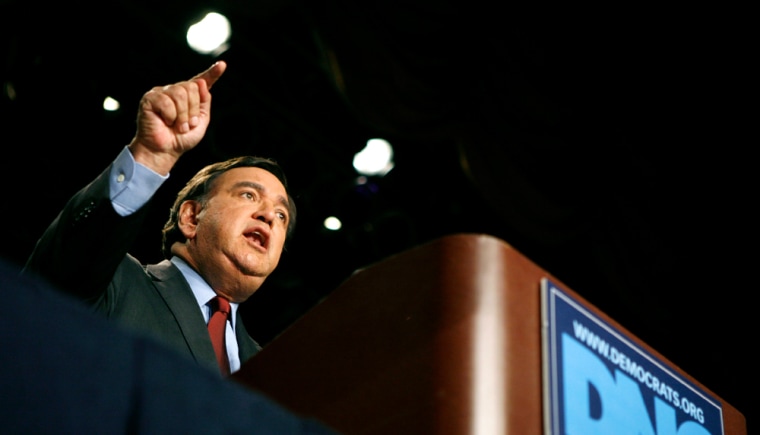Iran and its nuclear ambitions will face the next president as soon as he or she takes the oath of office.
Yet the prospect of a nuclear-armed Iran was a topic scarcely mentioned at the Democratic National Committee’s parade of presidential contenders this weekend in Washington.
Only long-shot contender Rep. Dennis Kucinich of Ohio spent any time in his speech warning of a U.S. military clash with Iran.
“The Democratic Congress must deny the president the money he wants to keep the Iraq war going to the end of his term, money which he can also use to attack Iran,” Kucinich declared.
Yet despite it being scarcely mentioned, the likelihood of U.S. military confrontation with Iran’s regime was very much on the minds of some Democrats who sat through two days of speeches by Kucinich, Illinois' Sen. Barack Obama, Connecticut's Sen. Chris Dodd, and seven other Democratic presidential hopefuls.
Democrats' fears of conflict
Ann Loikow, a former Foreign Service officer who lives in Washington, confronted Sen. Joe Biden, D-Del., with the Iran question as soon as he emerged from the ballroom where he’d just finished giving his speech to the DNC members.
“I made it clear when Secretary (of State) Rice was before us: if the president has plans to go to war with Iran he has no — emphasize no — constitutional authority to do that without the consent of the American people,” Biden told her. “Were he to do that, it would generate a constitutional crisis and we’ve been absolutely crystal clear with him on that.”
What Biden didn’t mention to Loikow is that he does think Bush has authority to order U.S. troops to go “in hot pursuit” after Iranians making IED’s and attacking American soldiers inside Iraq, if they cross the border back in Iran.
After ending her brief chat with Biden, Loikow told me, “I just look at the recklessness of what our administration is doing and I’m so afraid that either they will attack Iran or they’re going to encourage Israel to attack Iran and create a catastrophe.”
Asked about the possibility of Iran testing nuclear weapons, Loikow said “we are pushing them to do that. They’re petrified that the United States is going to do to them what we’ve done to Iraq — or that Israel is going to do that to them.”
She wants the president to tell Israel to sign the Nuclear Nonproliferation Treaty and open all its nuclear facilities to international inspectors. “Within a minute you’d see the Iranians just doing domestic power and all of this (conflict) would fall away,” she said.
“(Iranian president) Ahmadinejad is not necessarily representative of the government of Iran. We tend to demonize the individual, rather than look at the complexity of who is actually ruling the country.”
Richardson's comparative advantage?
It was Iran, as well as Iraq, Darfur and other crisis locales, that caused Bill Richardson, the former UN envoy and now New Mexico governor, to tell the assembled Democrats, “Experience in foreign affairs has never been more important.”
Richardson touted his credentials as a globe-trotting ambassador who has negotiated with the North Koreans, Yugoslavia’s late leader Slobodan Milosevic, and others.
He also won a standing ovation from the crowd when he spoke about getting American troops out of Iraq, declaring “a struggle between a country’s warring factions, where both sides hate the United States, is not worthy of one more lost American life.”
In that light, Richardson was exactly the right candidate to whom to pose the Iran questions that were troubling some Democrats at the DNC event.
“We’re at a very dangerous level right now because we have a policy of confrontation and not a policy of dialogue,” Richardson said.
He called for a “tough smart dialogue” with the regime in Tehran; "I would open a dialogue with some of the members of their foreign ministry; I know some of them; I negotiated with them before, when I was a congressman.”
He said the Bush administration has been “strengthening the hard-liners in Iran who, I believe, want a confrontation with the United States, like the president of Iran (Ahmadinejad). Instead we should be speaking to the Democratic forces in Iran: young people, intellectuals, and the business community.”
Send James Baker
His solution: Send former Secretary of State James Baker to open talks with the Iranian government.
Why Baker? He earned his diplomatic savvy by making 11 trips to Syria to persuade that régime to support the U.S.-led coalition in the first Gulf War in 1991.
“I would aim for a broadly based global agreement with Iran, where you reach certain understandings whose objective would be to promote stability… to reduce their terrorist activities, (working with) perhaps a coalition of European countries. In exchange for not imposing sanctions on Iran, Iran be allowed to develop a civilian nuclear capacity, properly monitored by the international community.”
Does Richardson think that by the time the next president takes office in January of 2009, the Iranian regime will already have nuclear weapons? “No, I think it’s four to six years away, so there’s still time,” he replied. “They don’t have the available technology yet, but in four to six years they will. In two years they won’t, so there still would be time, but I’d start right now” in negotiating with Tehran.
Given Ahmadinejad’s penchant for fiery rhetoric and the presence of two American aircraft carriers in the Persian Gulf, one can safely expect that other Democratic contenders in addition to Richardson will need to spell out their Iran policy —as well as their Iraq policy — in the months ahead.
